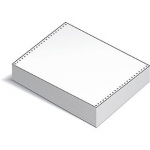 The Supreme Court provides two avenues for paper filings: (one) booklet format, and (two) 8 ½- by 11-inch format. The Court even keeps separate public dockets for these types of cases. Booklet format filings begin at docket number “__-1” and 8 ½- by 11-inch format, better known as in forma pauperis (IFP) filings, begin at docket number “__-5000.”
The Supreme Court provides two avenues for paper filings: (one) booklet format, and (two) 8 ½- by 11-inch format. The Court even keeps separate public dockets for these types of cases. Booklet format filings begin at docket number “__-1” and 8 ½- by 11-inch format, better known as in forma pauperis (IFP) filings, begin at docket number “__-5000.”
According to Sup. Ct. R. 39.5, respondents and appellees in a case originally filed on the IFP docket must respond in 8 ½- by 11-inch format:
The respondent or appellee in a case filed in forma pauperis shall respond in the same manner and within the same time as in any other case of the same nature, except that the filing of an original and 10 copies of a response prepared as required by Rule 33.2, with proof of service as required by Rule 29, suffices. The respondent or appellee may challenge the grounds for the motion for leave to proceed in forma pauperis in a separate document or in the response itself.
Thus, if the petitioner in your case has filed IFP, you must file your brief in opposition in 8 ½- by 11-inch format. If the Court denies the petitioner’s IFP status during its conference, he or she must pay to re-file the petition in booklet format. However, your original filing will suffice. See Sup. Ct. R. 33.2 regarding formatting and Sup. Ct. R. 29 regarding service of an 8 ½- by 11-inch format brief in opposition.
Amici curiae who file in support of an IFP petitioner or respondent must still file booklet format briefs.
Additionally, all parties in cases set for oral argument (i.e., cases on the merits stage) must file in booklet format, even if IFP status was granted on the petition stage. The Court will pay for the cost of printing an IFP party’s merits stage briefing. See Sup. Ct. R. 39.6 – 39.7.